Associated with romance, food, art, wine, and philosophy, French is one of the most popular languages in the world. Speaking it can grant you access to a rich wealth of cultural heritage, from film to literature to history. To that I say, ‘Oui, s’il vous plaît!’ Meaning, ‘Yes, please!’.
The multi-faceted language also has many practical benefits. French is the fifth most spoken language worldwide, with nearly 300 million speakers. And far from being the preserve of France, it is also the only language spoken on five different continents. People speak French widely in Canada, Haiti, Sub-Saharan and Northern Africa, and parts of the Middle East. No wonder it is one of the official languages of the United Nations and is considered important for diplomacy and international business.
So, whether you are hoping to woo a romantic interest or secure an exciting professional deal, knowing how to speak French can often set you apart and open you up to a host of possibilities. Learning a new language is also good exercise for the brain and can be a fun hobby to pass the time. This all sounds pretty magnifique to me.
Having said that, and as most people will know, learning a new language is no easy feat. Everyone learns differently, and I have found that most teaching styles have pros and cons that can either make or break your polyglot dreams. There is no right way, only the right way for you. It all depends on your goals, motivation, and how you learn. Before I dive into the best online French courses available, there are a few factors that you should note when choosing which French course to guide you in your language journey.
Table of Contents
Tips for picking your course
Thanks to the possibility of learning languages online, no one is limited to the courses that happen to be available where they live. But with so many options out there, it can be difficult to choose which one will be right for your learning needs. There are a few important things to consider:
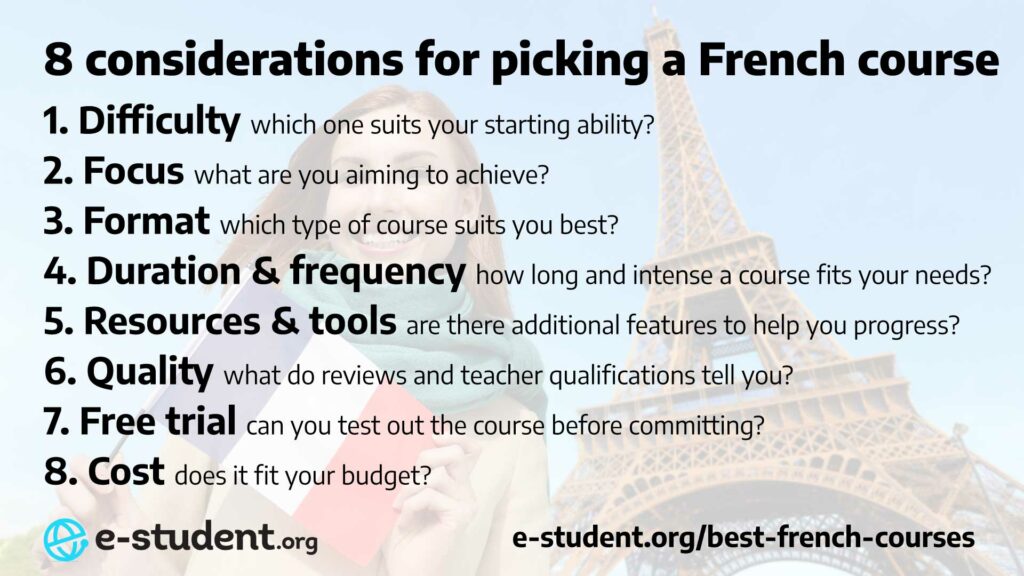
1. Level of difficulty
One of the first things to take into consideration is which online course will suit your language ability. Perhaps you are just beginning your French journey, or maybe you are in your intermediate phase and want to be challenged by more advanced content. Wherever you stand, choosing a course suited to your abilities will ensure you don’t waste valuable time and money.
While most courses will say whether they are aimed at beginners, intermediate, or advanced speakers, these terms can have several meanings. There is a difference between a complete beginner who has never spoken or read a word of French and an upper beginner who can maybe string a greeting and introduction together. For this reason, it’s important to look at course reviews from learners themselves or to consider courses that offer free trials or placement tests.
2. Course focus
Whether you are a beginner or advanced, there may be elements of the French language that you would like to concentrate on more than others. For example, if you are moving to Paris for a gap year, you may want a course that focuses on conversational skills. As a student hoping to study further in France or elsewhere, you might opt for a course focusing on reading and writing. Quite popular are courses for professionals who may need to engage conversationally in French. Additionally, you may want to build up towards passing a French language test such as the DELF/DALF. Certain courses may be more geared towards preparing students for this. Whatever it is you are looking for, you should keep it in mind when assessing your options.
3. Format of the course
While traditional language courses involve going to in-person classes, learning languages online opens up a world of different teaching and learning formats. Some language courses and websites offer live online tutorials with teachers. This is most like in-person learning and can be a quicker way of learning because you can ask questions, interact, and practice conversations. But live lessons do tend to be pricier.
Most online courses are web- or app-based and use self-study tools such as written tutorials, recorded lessons from a teacher, and recap tools like quizzes. They tend to be cheaper than live lessons with a teacher, and more convenient because you can study whenever you have a spare moment handy. They can be fun and interactive, using a game-style format, or they can be more formal and academic.
The downside is that there is less accountability. To improve your French, like any language, you need to be consistent with investing your time. So, with web-based language courses, you need to be motivated and self-disciplined to keep at it and improve. Though some apps do have built-in reminders or other features that can help to motivate you on your language learning quest.
4. Duration and frequency of study
Online language courses can range from yearlong to just a couple of weeks, and it can be an intense five-days-a-week program, or it can have a more gradual approach, such as having weekly lessons. The lessons themselves can also vary from just 10 mins to 45 minutes or hour-long sessions. With online courses, the tutorials tend to be on the shorter side so they can easily fit into your day. Which routine is better for you will depend on how much spare time you have, how fast you want to learn, and other factors such as price.
5. Additional resources and tools
Different courses may offer a variety of online tools that can complement and reinforce the learning process. Instead of a live teacher, some courses may include pronunciation tools that correct your French articulation in real-time. Others may have quizzes, MCQs, or flashcards which can be useful when trying to test and strengthen your memory and knowledge. If convenience is very important to you, then courses that offer mobile applications might be attractive as you can learn while you wait in the queue or commute to work.
A popular method used by online courses is spaced repetition, which is the idea that your knowledge of the language should be reviewed and tested repeatedly and spaced out over time. For example, perhaps at the end of your fifth lesson, you will be quizzed not only with the most recent content but also with things you learned in your first lesson. Many programs also feature intelligent software that can personalize this process, so that, for example, you are tested on topics you struggled with before.
6. Quality
You want to ensure that whatever online language course you choose is going to give you the results that you desire. To gauge the quality of the course, it is best to look at various features depending on the type of course. If the course involves live or recorded lessons from a teacher, then you should check the qualifications and accreditations of the tutors on offer. In addition, you should check the app ratings and reviews from users who have had personal experience with the course. Even though everyone’s needs are different, there are tons of language courses out there, and these evaluations should give you some idea about whether you are investing your money in something worthwhile or not.
7. Free trials to test the waters
Having so many options when it comes to learning French can seem overwhelming. It can also be difficult to predict which schedule or learning approach will fit best into your life. This is why it can be beneficial to choose a language learning provider which offers a free trial version of the course so you can test it out. While committing one or two hours a week may seem doable, you might find that it’s too much, or maybe you’ll realize you can afford to commit more time to master the language of love.
8. Cost
With so many courses available, there is guaranteed to be a French language course that can fit into your budget. Live lessons will generally be more expensive than web and app-based courses, and often the higher costs of online courses will reflect more sophisticated content and learning tools. Having said that, if you are just wanting to dip your toes in and try out learning a language, then there are also plenty of courses that are high in quality and free. We’ll now turn to reviewing some of them.
Recommended French courses
Best overall: Rocket French (Rocket Languages)
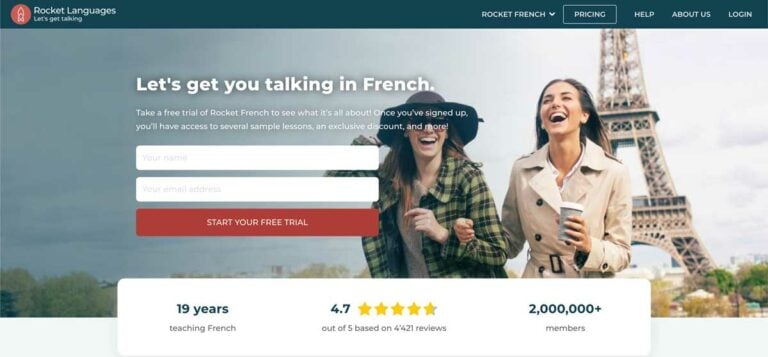
- Teaches you how to have conversations
- Comprehensive – includes lessons on writing, grammar, culture, reading, speaking, and understanding spoken French
- Free trial
- Coupon discounts
- Reinforces learning through tests
Cons
- Pricey
- Slightly less emphasis on grammar and writing
- Users report that lessons can be repetitive
For those wanting a self-paced French course that emphasizes conversation and speaking, Rocket French from Rocket Languages provides an interactive audio-based program. The lessons contain various stages, including an audio section, and a grammar and writing portion, and they even include information about French culture.
One of its unique features is that it focuses on teaching learners how to speak and understand spoken French rather than just its written form. When focusing primarily on writing, second-language speakers lose out on learning how to have real-life conversations with native speakers of the language. Like many other programs, Rocket Languages has a library of audio clips from native French speakers so that you can copy the pronunciation. But what’s more, it also has advanced voice recognition software which can record your voice and rate its pronunciation compared to native speakers. It also records your voice so that you can learn by comparing it with different pronunciations yourself.
The lessons last 30 minutes and are structured and comprehensive. Rocket Languages features a mobile app for easy on-the-go learning, and it has various tools for reinforcing what you have already learned. There are quizzes at the end of each lesson, flashcards, and different tests which focus not only on writing but also speaking and translation. Aimed at beginner and intermediate speakers of French, there are three levels of the program, which each differ in price, though none are particularly cheap.
Best for Listening Comprehension: FrenchPod101
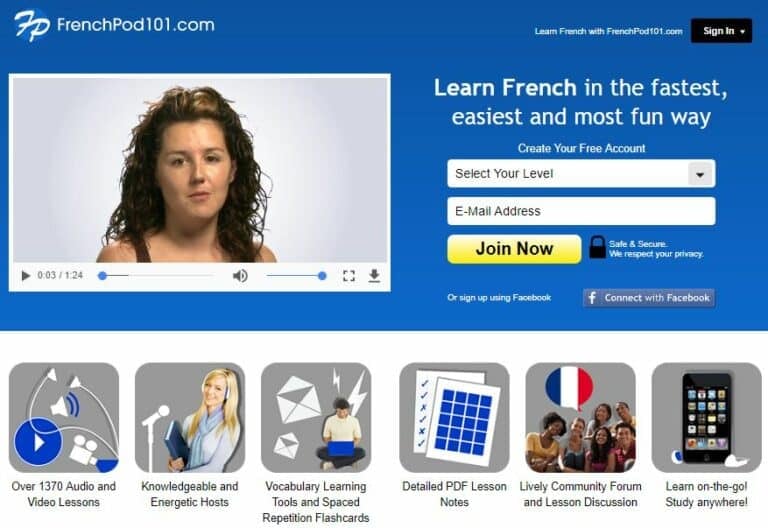
- Affordable
- Good for understanding spoken French
- Premium Plus Subscription includes live one-on-one lessons with a French teacher
- Releases new content every week
Cons
- Less focused on grammar, writing, reading, and speaking
- Website and tutorials can be difficult to navigate
- Can be unclear which lesson to start next
- Material for advanced French speakers is sparse
Even if you can read and understand the French language, you might still come up blank when trying to understand a native speaker. They might talk quickly, and it’s easy to fall behind. FrenchPod101 is a primarily podcast-based course that guides you through French conversations and focuses on listening comprehension. Audio and video lessons feature different teachers so that you can become comfortable with a variety of speech styles.
The lessons are diverse, ranging from grammar and phrases to culture and customs, and you can choose the ones most suited to your needs. The Basic Plan, at an inexpensive $8 per month, includes unlimited access to all of them as well as transcriptions, notes, and lists of key French words and phrases. The Premium Subscription also features a line-by-line audio dialogue breakdown so that each sentence is slowed down and translated with time added so that you can practice pronunciation. Tools for reinforcing learning, such as interactive quizzes, voice recordings, flashcards, and word banks, are also included.
If you want to learn faster and ask questions, the Premium Plus version also gives you access to one-on-one lessons with a French teacher so that you can further personalize your learning journey. FrenchPod101 is the right option for someone wanting to understand spoken French on a budget.
Best Intuitive Learning Design: Busuu French

- Organized and well-designed course
- Offers placement tests
- You receive a certificate at the end of the course
- Free version and free trial available
Cons
- Less relevant if not aiming to pass the HSK
Ideal for beginners to intermediate French speakers, Busuu offers an affordable and slick program for learning French. It combines various components of language learning, an easy and intuitive design, flexible lesson durations, and an interactive social community of native French speakers.
For those just wanting to learn a bit of vocab for a vacation in a French-speaking country, Busuu offers a free plan covering some useful French vocabulary along with examples of those words being used in relevant sentences. You also have limited access to lessons focusing on grammar rules and listening skills.
But the real perks of Busuu come with its Premium and Premium Plus versions. Instead of scrolling through the different levels to see where you should start, the program offers a placement test that will tell you your language grade. Though some reviewers are not convinced that these levels correspond to the grade requirements of the European Framework of Reference for Languages (CEFR), it can still be useful if you don’t know where to start.
This is a course that comes with a fair bit of freedom. You can create your own personalized study plan based on your main focus or goals, whether you want to learn a bit of French in preparation for your holiday or become fluent. You can also choose the days and times of the week that you want to learn, and you’ll be reminded if you should be studying.
Like many other language apps, there are exercises for practicing pronunciation, vocabulary, translation, and grammar. It even boasts an AI-powered grammar learning tool that enhances learning by focusing on a person’s weak points when it comes to writing the language.
One of the biggest perks of Busuu’s Premium Plus subscription is that you gain access to a social community of French native speakers. Uniquely combining language learning with a social medium, the program allows you to receive feedback and practice conversing in French.
Best for Fluency: Glossika French
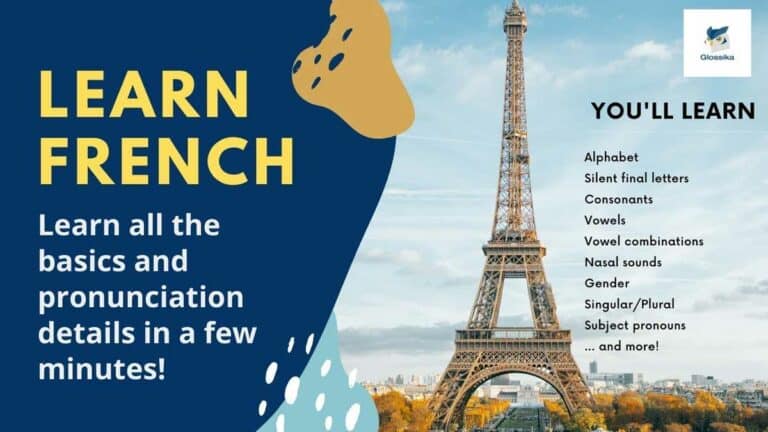
- Teaches you to speak French
- Good for improving fluency, so useful even for advanced learners
- Free trial available
- Intelligent progress tracking and learning
Cons
- Mobile app only available for iOS
- Can be overwhelming for absolute beginners
- Little structured focus on grammar and dialogue
- Pricey
Consistency is key to learning a language, and there is something to be said for learning through repetition. Glossika focuses on teaching learners how to listen to and speak French at native speed. It is convenient and primarily audio-based, so you can learn while walking to the shops or standing in a queue. While this may not be ideal for those wanting to become better at writing French, Glossika emphasizes learning and repeating useful sentences rather than language rules. While this may sound like an odd way to study, this is actually how children learn their native tongues – through listening, repeating, and inferring the rules after the fact.
You can choose what topics you are interested in, such as ‘Travel’ or ‘Social’. You can also decide how you would like to learn, whether you’d find it more useful to repeatedly write down sentences or listen and repeat out loud. Glossika’s spaced repetition tool enables you to choose how many times you’d like the sentence to repeat and for how long you would like to repeat it. It is intelligent and will naturally repeat certain words in different sentences with varied grammar structures until you have mastered them and are ready to move on. Through this strategy, you are supposed to learn the grammar rules indirectly.
Best for Immersion: FluentU French
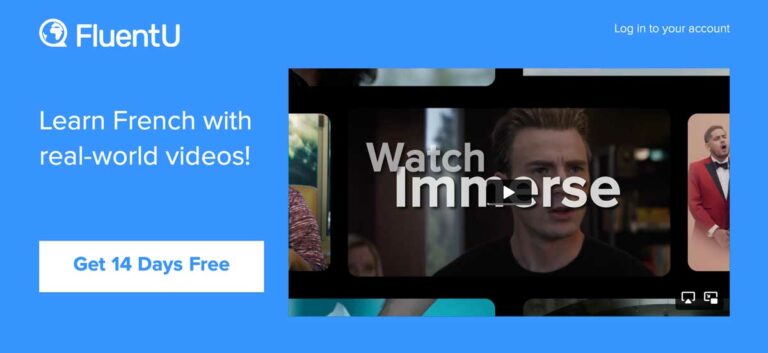
- Entertaining and culturally informative videos
- Can improve listening, comprehension, and vocab
- Mobile app for on-the-go learning
- Moderately priced and has discounts for year-long subscriptions
- Free trial
Cons
- No structured progression of learning
- Not suitable for absolute beginners
- No tutorials on grammar, writing, or dialogue/conversation
It can be challenging to move from learning some French vocab and grammar rules to being able to hold a conversation. Becoming more fluent and comfortable with any language requires not only reading and writing but also being immersed in a space where people are using the language naturally. But this does not necessarily mean you must book a flight to a French-speaking country. FluentU approaches language learning by encouraging learners to engage with real-world videos from native French speakers.
Learners have thousands of videos to choose from, ranging from politics to science and music videos to TED talks and beyond. This enables you to cater your learning toward subjects of interest. But FluentU does more than just curate French videos. It has sophisticated tools that facilitate the learning process, such as written and audio transcripts, the ability to replay and loop specific words or sections, and a dictionary built into the videos so you can look up the meaning of words. There are also memorization and review tools like personalized quizzes, flashcards, and spaced repetition based on what you have already learned.
Best University-Led Course: Étudier en France (Coursera x Institut Polytechnique de Paris)
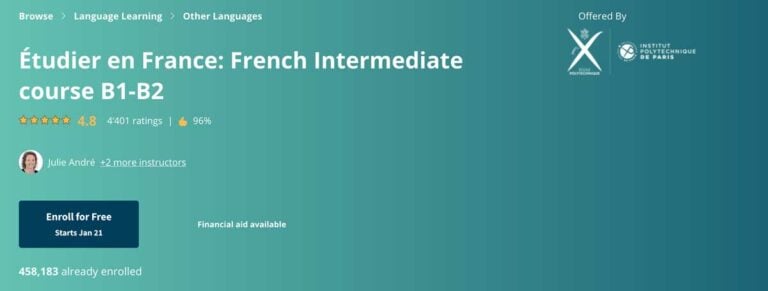
40% ($140 USD) off your first year of Coursera Plus Annual (expires 2 December 2024)
- Possible to access (to "audit") the course for free
- Perfect for intermediate French speakers moving to France to study
- Created by qualified French language academics
- Engaging and relevant content
Cons
- Not very accessible for new intermediate speakers, better for those wanting a recap
- Reviewers have said the course is closer to B1 level
France is one of the world’s top study destinations, home to thousands of international students attracted by its high-quality education, interesting culture and history, and delectable cuisine. Offered by the leading French university, Institut Polytechnique de Paris (IP Paris), this French course offered through Coursera is aimed at those moving to France or another French-speaking country for their higher studies – but it is equally useful for others looking for a rigorous French program. Unlike many other online French programs, it is graded at an intermediate level, or B1/B2, in accordance with the requirements of CEFR.
The program is six weeks long and covers all the necessary components of language learning including spoken and written comprehension, writing, grammar, vocabulary, and speaking. Each week is focused on an aspect of moving to and studying in France, from arriving in France and finding accommodation to getting comfortable with the French university system. It also includes lessons on France’s cultural and political landscape, as well as how to adapt to daily life such as opening a bank account. Engaging and diverse, the course is delivered through tutorial videos and text from university lecturers and teachers, as well as through short snippets from films and testimonials from French or foreign learners studying in France.
A great feature of this MOOC (Massive Open Online Course), is that it’s possible to access all of the course material for free. However, you are missing out on features, as well as getting a certificate at the end of the course. Full access, including the certificate of completion, is $49. It should also be noted that this certificate is not equivalent to the official French language tests issued by the French Ministry of Education, such as the DELF and DALF.
Best for Casual Learning: Duolingo
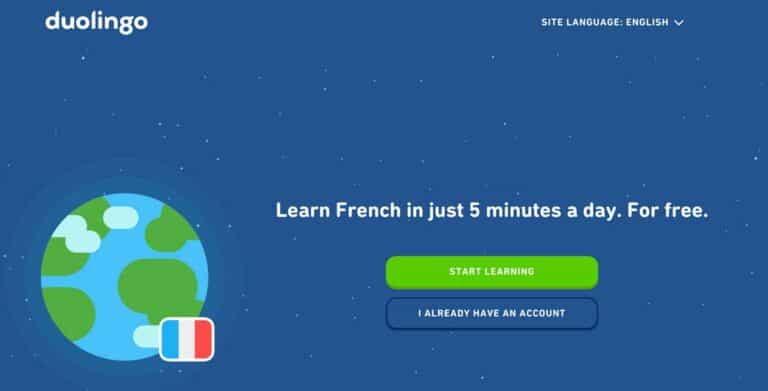
- Free and easy to use
- Fun, colourful, and entertaining style
- Good for casual learners or those wanting to complement/recap existing knowledge
- Motivates learners to be consistent
Cons
- No certificates
- Probably too basic for advanced learners wanting progression
- Sometimes examples include language rules that haven't been taught yet
- Sentences meant to be translated are sometimes impractical or nonsensical
- Accepted answers to questions sometimes unnecessarily limited
Probably the world’s most popular platform for learning languages, Duolingo is a fun, game-style app that is free and caters to casual beginners and intermediate to advanced speakers wanting recaps and some extra French practice. While the motivation to learn might wane from day to day, the app keeps you on your toes through push notifications that encourage you to maintain your ‘daily streak’.
The app features a well-designed and engaging interface, and the French courses are designed to be completed in succession, starting from the basics at level 1. More intermediate and advanced learners can move to the more challenging levels by taking tests to pass the earlier levels. Duolingo keeps students encouraged by using a point system whereby they must earn a certain number of experience points to complete a lesson. There are also various games and quizzes to keep learning enjoyable.
Although Duolingo promotes consistency, it also gives learners control of over how in-depth they want to study. They can choose how long they would like to study per day and can also choose to be a ‘casual’ learner who needs to earn just 10 points to reach the next goal/lesson, or a more serious learner who must earn at least 50 points to advance.
Best for Live Lessons: Berlitz Connect
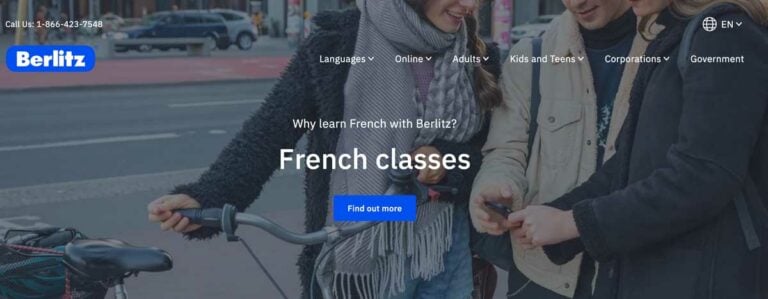
- Professional and high-quality service
- Convenient self-paced study and time with live instructor
- Emphasis on conversation
Cons
- Expensive
- Less focus on writing and grammar
- Probably not worth the price tag for complete beginners since live sessions focus on conversation
If you are wanting to combine the convenience of online self-paced study with the advantage of formal live tutoring sessions, then Berlitz Connect might be the right choice for you. With this course, you can engage with topics that are of interest to you in your own time. But you can also organize speaking practice sessions with live native Berlitz instructors if you need help with a particular section or subject. The material covers a range of topics, so you can choose what to study based on whether you want to learn French for travel, study, or professional reasons. The Berlitz placement test will also ensure that your portal features content appropriate to your language level.
Berlitz is an old and well-known in-person language training provider which focuses on immersive learning. Their online programs also strive to be engaging and interactive, using voice recognition, videos, and written content which are available online and offline. There is progress tracking to ensure that you are reaching your goals and plenty of activities and exercises that link your language learning to real-life scenarios. This is enhanced by time with a live instructor with whom you can practice your French through conversations and role-plays.
Best Free Crash Course: Alison
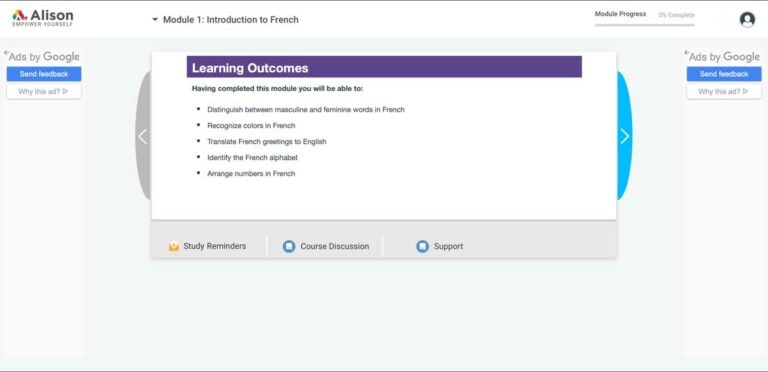
- Free courses (pay to remove ads and receive certificates)
- Good for complete and upper beginners
- Structured
Cons
- More traditional/academic learning
- Only three hours long
- Practice lacks features (no spaced repetition etc.)
For beginners wanting a free introductory French program, Alison offers a structured course to get you started. While some language courses focus more on conversation and practical language skills, Alison offers modules that deal with basic grammar, tenses, everyday vocabulary, and the pronunciation of the French alphabet.
The course progresses from one module to the next, with an assessment at the end of each. The modules include a video on a given topic – from greetings to tenses, masculine vs. feminine words, family, and household objects – followed by further explanation of the grammar concept or vocabulary. At the end of the course, you must pass an assessment with at least 80 % to receive a free certificate.
For those wanting to further their studies, there is also a free Diploma in French Language Studies offered by the University of Texas. While also technically a beginner’s course, this program is more in-depth including sections on topics such as your studies, your profession, looking for a job, shopping, and finance. Short interviews with French natives are also used to demonstrate pronunciation and improve oral comprehension.
Conclusion
Whether for work, study, travel, or to immerse yourself further in the rich French culture, there are plenty of reasons to learn the often poetic and romantic French language. If this goal has been gathering dust on your bucket list, then there is little excuse to put it off any longer. There are many courses are available, and several are free or offer free trials. And now that you know a little more about the best online French courses, you can ensure that you start your learning adventure on solid ground. Amuse-toi bien!



